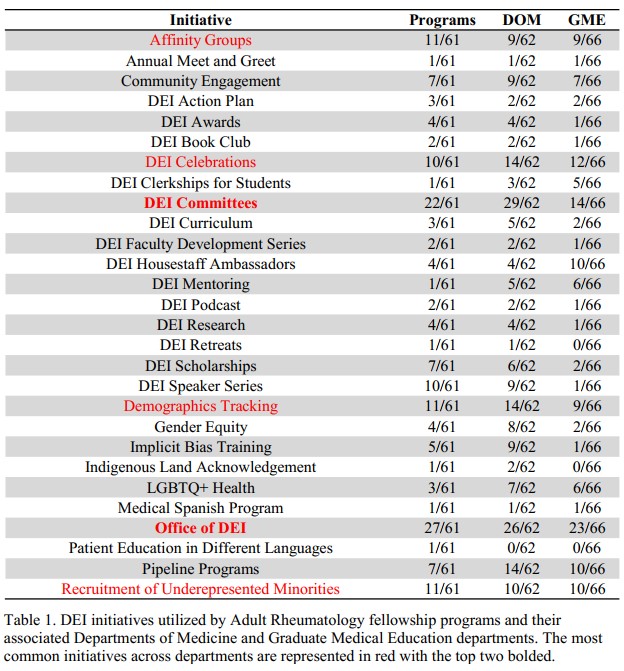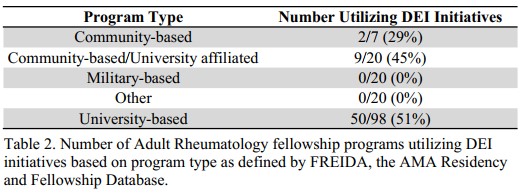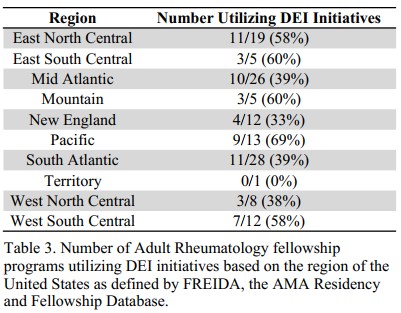Session Information
Session Type: Poster Session B
Session Time: 10:30AM-12:30PM
Background/Purpose: The ACR 2015 Workforce Study Report highlighted a lack of diversity within the workforce with 73.6% of Adult Rheumatology providers identifying as White, 15% identifying as Asian, and 0.8% identifying as African American. The Committee on Training and Workforce Issues noted that diversity of the workforce was a “critical topic of concern” and “an area in which the ACR should focus specific initiatives.” (1) It is important for a healthcare workforce to be reflective of the community it serves to provide culturally competent care and reduce healthcare disparities. There is a lack of data on the utilization of diversity, equity, and inclusion (DEI) initiatives within US ACGME-accredited Adult Rheumatology fellowship programs which precludes an assessment of the efforts being implemented by the subspecialty and the graduate medical education (GME) community. The purpose of this project was to analyze the use of DEI initiatives within US ACGME-accredited Adult Rheumatology fellowship programs, the Departments of Medicine (DOM), and the GME departments associated with them, and to determine if incorporation of DEI varies by the type of training program and between geographic regions.
Methods: FREIDA was accessed to search for Rheumatology (IM) fellowship programs. There were 129 ACGME-accredited Adult Rheumatology fellowship programs available for review. The program name, the state in which the program was located, the region as classified by FREIDA and the program type were obtained. The websites for each fellowship program, the DOM, and the GME departments associated with them were reviewed. Initiatives mentioned on the websites or links to web pages highlighting initiatives were assessed.
Results: Approximately 48% of programs, 62% of DOMs, and 52% of GME departments mentioned DEI initiatives on their websites. One program, 29 DOM, and three GME departments did not have a website available for review. Approximately 51% of University-based programs, 45% of Community-based/University affiliated programs, and 29% of Community-based programs mentioned DEI initiatives on their websites. The regional breakdown was highest for the Pacific with approximately 69% of programs and lowest for New England with approximately 33% of programs. No Military-based, Other, or Territory programs mentioned DEI initiatives. Offices of DEI, DEI Committees, tracking of demographics, DEI celebrations, recruitment of underrepresented minorities, and affinity groups were the most common initiatives utilized.
Conclusion: Less than half of Adult Rheumatology fellowship programs utilized DEI initiatives. There were a higher number of University-based programs utilizing DEI initiatives when compared to Community-based/University affiliated and Community-based programs. There were regional differences in the utilization of DEI initiatives. There was variability in the types of initiatives being utilized. Though including only publicly available data, the results highlight that much more needs to be done to improve the use of DEI initiatives in Rheumatology fellowship programs to diversify the workforce.
(1) 2015 Workforce Study of Rheumatology Specialists in the United States. American College of Rheumatology
To cite this abstract in AMA style:
Ali H, Kwiatkowski A. An Analysis of Diversity, Equity, and Inclusion Initiatives in US ACGME-accredited Adult Rheumatology Fellowship Programs [abstract]. Arthritis Rheumatol. 2024; 76 (suppl 9). https://acrabstracts.org/abstract/an-analysis-of-diversity-equity-and-inclusion-initiatives-in-us-acgme-accredited-adult-rheumatology-fellowship-programs/. Accessed .« Back to ACR Convergence 2024
ACR Meeting Abstracts - https://acrabstracts.org/abstract/an-analysis-of-diversity-equity-and-inclusion-initiatives-in-us-acgme-accredited-adult-rheumatology-fellowship-programs/



